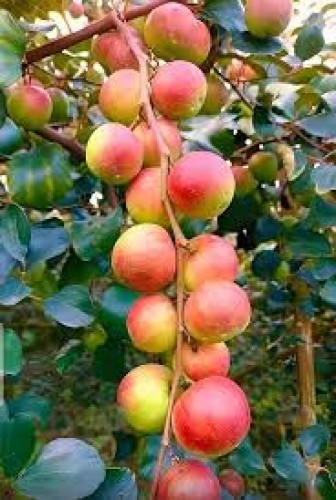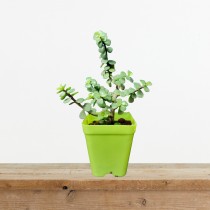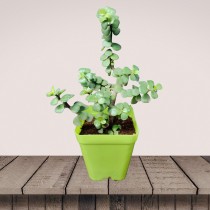off
-
Sold
-

out
Apple Ber Plant: Uses, Care & Advantages
The Apple Ber Plant (scientifically known as Ziziphus mauritiana) is a hardy and drought-resistant fruit tree native to India and other parts of Asia. Known for its apple-like shape and sweet, tangy flavor, the Apple Ber produces small fruits that are nutritious and packed with health benefits. This plant is easy to care for, grows rapidly, and is suitable for cultivation in a wide range of climates.
Care of the Apple Ber Plant
The Apple Ber plant requires minimal care but benefits from proper attention to its growing conditions. Here are key care tips for this fruit tree:
- Climate: Prefers warm, tropical or subtropical climates with temperatures ranging from 25°C to 35°C (77°F to 95°F). It is well-suited for hot, dry regions and is drought-resistant.
- Sunlight: Needs full sunlight for at least 6–8 hours daily for optimal growth and fruit production.
- Soil: The plant grows best in well-drained sandy loam or clay loam soil. It can tolerate slightly alkaline soil but prefers neutral pH (6.5–7.5).
- Watering: Though drought-tolerant once established, the plant requires regular watering during the early stages of growth and while bearing fruit.
- Fertilization: Apply organic compost or balanced fertilizers during the growing season to boost the tree’s growth and fruit yield.
- Pruning: Prune the tree to remove dead or diseased branches, and to improve the shape and air circulation. Pruning helps the plant maintain a good structure.
- Pest & Disease Control: Apple Ber trees are generally resistant to pests, but occasional infestations of aphids, mealybugs, or scale insects may occur. Use organic pesticides such as neem oil for pest control.
Advantages of the Apple Ber Plant
- Nutritional Benefits: Apple Ber fruits are rich in vitamin C, antioxidants, fiber, and minerals like calcium, iron, and potassium, which promote overall health.
- Health Benefits: The fruits and seeds have medicinal properties used in traditional remedies for digestive issues, immune enhancement, and improving skin health.
- Drought Tolerance: Apple Ber is highly drought-tolerant, making it an ideal choice for arid or semi-arid regions where water conservation is important.
- Fast Growing: The tree grows quickly and begins to bear fruit within 2–3 years, offering quick returns for gardeners and farmers.
- Low Maintenance: Once established, Apple Ber trees require little care, making them an excellent choice for low-maintenance gardening.
- Long Lifespan: Apple Ber trees are long-lived and can continue to produce fruit for decades when well-maintained.
Uses of the Apple Ber
- Fresh Consumption: The fruits are eaten fresh, offering a sweet, tangy flavor and a crunchy texture. They are often enjoyed as a healthy snack.
- Dried Fruits: The fruit is commonly dried and consumed as a nutritious snack or used in traditional medicine preparations.
- Jams & Jellies: Apple Ber is used in making jams, jellies, and preserves due to its natural sweetness and tangy taste.
- Medicinal Uses: The fruit, seeds, and leaves are used in Ayurvedic medicine for their ability to treat digestive disorders, boost immunity, and improve skin health.
- Skin Care: Extracts from the fruit are used in skincare products for their hydrating, anti-aging, and rejuvenating properties.
- Juices & Beverages: The fruit is often used to make refreshing beverages, including juices and smoothies, which are packed with vitamins and minerals.
Conclusion
The Apple Ber plant is a highly versatile fruit tree that provides numerous benefits, from its rich nutritional profile to its easy-care nature. With its drought resistance, rapid growth, and long lifespan, it is a valuable addition to any garden or farm. Whether for its delicious fruit, medicinal properties, or ornamental appeal, the Apple Ber tree offers a range of advantages for both health and aesthetics.

